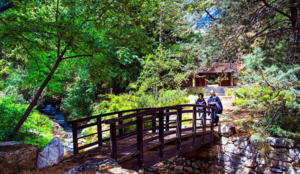Finding Stillness in the Midst
Zen lessons from the Ventana Wilderness
“The way we take care of nature is the way we take care of ourselves.”
– Sozan Miglioli,
For centuries the connection between Zen practice and nature has been interwoven. In Japan, where the Soto Zen school of Buddhism began in the 13th century, many training monasteries and temples were built in the mountains, and many Zen teachers would adopt the name of the mountain where they trained. In Zen practice the mountains mirror back what you seek to create in yourself, to find stillness in the midst of the hum of life around you.
 So, when the San Francisco Zen Center was founded in 1962 by Shunryu Suzuki Roshi, they began looking for a site for their own mountain monastery. The old Tassajara Hot Springs and Hotel, located a few hours south of San Francisco on the central coast, provided the perfect opportunity. The Zen Center purchased several properties around the hot springs in 1967 and established the Tassajara Mountain Zen Center. Just two years later the land around it was designated as the Ventana Wilderness. Since then, generations of Zen students have come to Tassajara to be in the wilderness, walking its trails, sitting beneath its trees, and learning its lessons.
So, when the San Francisco Zen Center was founded in 1962 by Shunryu Suzuki Roshi, they began looking for a site for their own mountain monastery. The old Tassajara Hot Springs and Hotel, located a few hours south of San Francisco on the central coast, provided the perfect opportunity. The Zen Center purchased several properties around the hot springs in 1967 and established the Tassajara Mountain Zen Center. Just two years later the land around it was designated as the Ventana Wilderness. Since then, generations of Zen students have come to Tassajara to be in the wilderness, walking its trails, sitting beneath its trees, and learning its lessons.
This summer the Trust purchased 160 acres next to Tassajara from the San Francisco Zen Center with the goal of transferring it to public ownership. For the Zen Center, the decision to work with the Trust to protect the property came easily: “One of the main tenets of Zen is the understanding that there is no separation. When one thing happens, it has an effect in the whole universe. This means there is no separation from nature— the way we take care of nature is the way we take care of ourselves. Conservation is an expression of this caretaking” says Sozan. With the property now protected, it will be open for people from all walks of life and spiritual practices to come and learn its lessons of resiliency, stillness, solitude, and connection.


